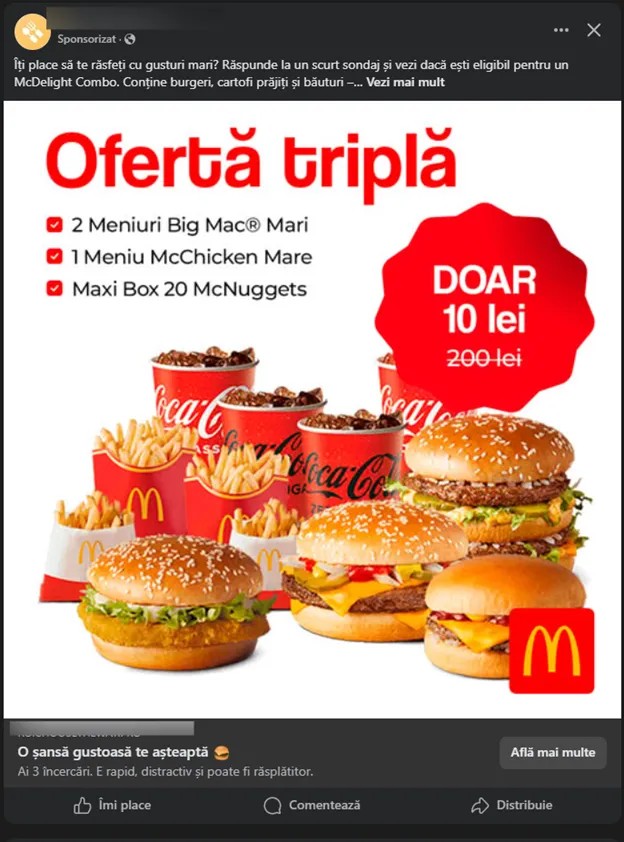
Nel contesto della proliferazione di truffe online, la Romania ha assistito a una truffa particolarmente su larga scala mascherata da promozione di McDonald’s. Più di 10.000 persone sono state attirate in una truffa che inizialmente si presentava come un’offerta allettante: un hamburger, patatine fritte e bibite per soli 10 lei, l’equivalente di circa due dollari.
Su Instagram e Facebook, i truffatori hanno lanciato una serie di annunci pubblicitari per conto di un marchio inesistente, McDelight România. Con il pretesto di partecipare a una “tripla promozione”, agli utenti è stato chiesto di compilare un breve sondaggio e di partecipare a un semplice gioco. A tutti è stata promessa la possibilità di vincere un premio e, sorprendentemente, tutti hanno vinto.
A questo punto, le potenziali vittime si sono sentite come se avessero fatto jackpot, come confermato da immagini in stile McDonald’s e da recensioni apparentemente autentiche da parte dei “clienti”.

Il passo successivo era compilare un modulo con i dati personali, inclusa una carta di credito, presumibilmente per pagare una cifra simbolica. Tuttavia, le condizioni, scritte in caratteri minuscoli, nascondevano la vera essenza della truffa: un abbonamento con addebito automatico di 63,42 euro ogni due settimane. Questa somma iniziò a essere addebitata regolarmente sulle carte delle vittime, e il pranzo da due dollari pubblicizzato è rimasto presto un’illusione irrealizzabile.
Gli specialisti di Bitdefender hanno rivelato i dettagli del piano, sottolineando che la campagna fraudolenta è iniziata il 17 luglio e continua a guadagnare terreno. Secondo i loro dati, ci sono almeno sei varianti di tali annunci in rotazione su Meta e il piano stesso si è già diffuso oltre la Romania: azioni simili sono state registrate in Ungheria e nei Paesi Bassi.
La piattaforma fasulla non solo sfrutta elementi visivi che ispirano fiducia, ma gioca anche attivamente sui sentimenti di urgenza e scarsità, creando l’illusione di un’offerta limitata. Tali tattiche la rendono particolarmente pericolosa sui social media, dove l’attenzione degli utenti è discontinua e il comportamento è spesso impulsivo.
Bitdefender sottolinea: nessuna vera azienda addebiterà più di 60 euro ogni 14 giorni in cambio di un hamburger gratuito. Qualsiasi “promozione” con pagamento anticipato richiede una valutazione critica. Si consiglia agli utenti di non inserire i dati di pagamento su siti sospetti, di studiare attentamente i termini e le condizioni e di segnalare annunci fraudolenti al supporto di Meta. Se cadete in una trappola, contattate immediatamente la vostra banca per annullare gli addebiti non autorizzati.
L’incidente evidenzia ancora una volta quanto facilmente una pubblicità visivamente accurata possa trasformarsi in un costoso inganno, soprattutto se le clausole scritte in piccolo non vengono lette in tempo.
Ed inoltre evidenza quanto sia facile avviare una campagna di Advertising a nome di una grande azienda, superando le difese informatiche gestite dalle intelligenze artificiali, in questo caso di Meta.
Ti è piaciuto questo articolo? Ne stiamo discutendo nella nostra Community su LinkedIn, Facebook e Instagram. Seguici anche su Google News, per ricevere aggiornamenti quotidiani sulla sicurezza informatica o Scrivici se desideri segnalarci notizie, approfondimenti o contributi da pubblicare.

 Vulnerabilità
VulnerabilitàVenerdì sera l’exchange di criptovalute sudcoreano Bithumb è stato teatro di un incidente operativo che ha rapidamente scosso il mercato locale di Bitcoin, dimostrando quanto anche un singolo errore umano possa avere effetti immediati e…
 Cybercrime
CybercrimeLe autorità tedesche hanno recentemente lanciato un avviso riguardante una sofisticata campagna di phishing che prende di mira gli utenti di Signal in Germania e nel resto d’Europa. L’attacco si concentra su profili specifici, tra…
 Innovazione
InnovazioneL’evoluzione dell’Intelligenza Artificiale ha superato una nuova, inquietante frontiera. Se fino a ieri parlavamo di algoritmi confinati dietro uno schermo, oggi ci troviamo di fronte al concetto di “Meatspace Layer”: un’infrastruttura dove le macchine non…
 Cybercrime
CybercrimeNegli ultimi anni, la sicurezza delle reti ha affrontato minacce sempre più sofisticate, capaci di aggirare le difese tradizionali e di penetrare negli strati più profondi delle infrastrutture. Un’analisi recente ha portato alla luce uno…
 Vulnerabilità
VulnerabilitàNegli ultimi tempi, la piattaforma di automazione n8n sta affrontando una serie crescente di bug di sicurezza. n8n è una piattaforma di automazione che trasforma task complessi in operazioni semplici e veloci. Con pochi click…